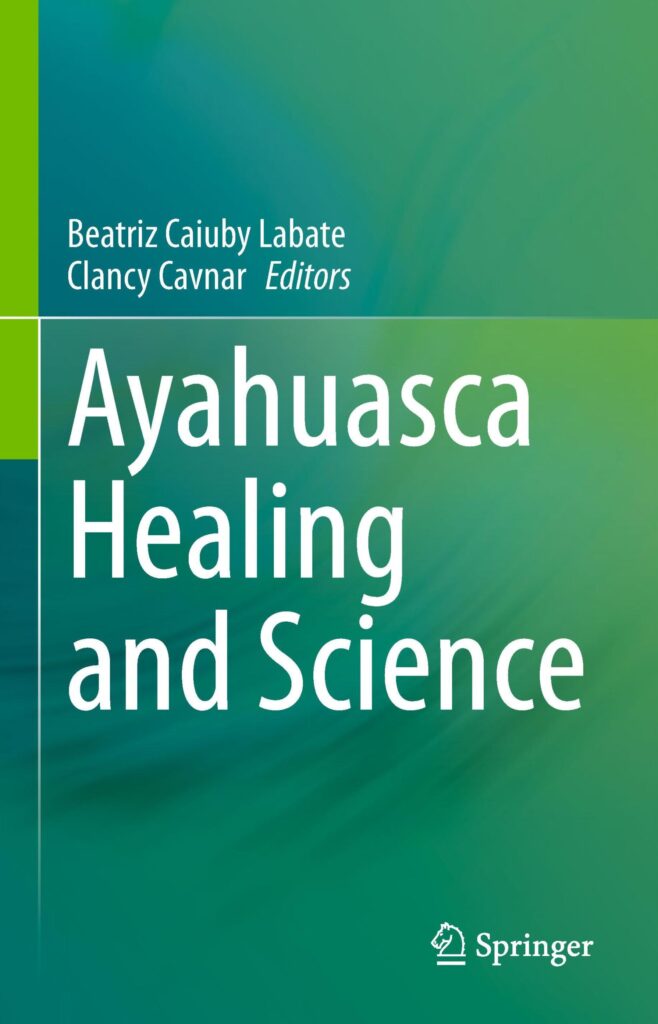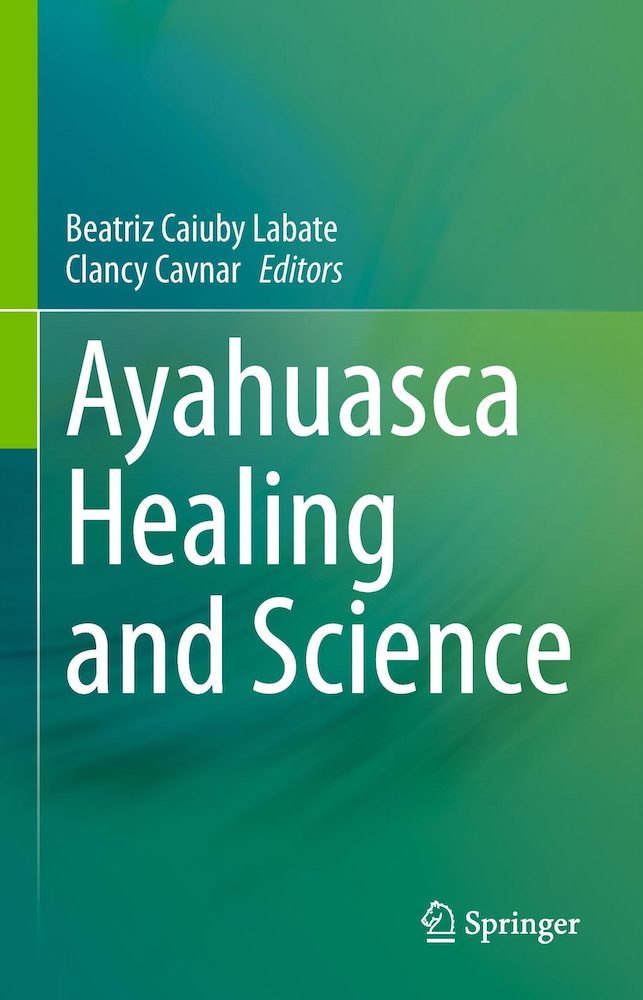- Meet Chacruna at Psychedelic Science 2025 - May 27, 2025
- Psychedelics and Attachment: Fundamentals, Implications, and New Frontiers - May 16, 2025
- Development Outreach Internship (OPEN) - May 6, 2025
The Chacruna Institute for Psychedelic Plant Medicines published their book, Ayahuasca Healing and Science, edited by Beatriz (Bia) Labate, Ph.D., and Clancy Cavnar, Psy.D. The book provides a robust, academic reflection on the methodological, ethical, and political aspects of the research and therapeutic use of ayahuasca. Mental health professionals, medical practitioners, social scientists, and educators will find this book relevant to their work regarding substance abuse, alternative medicine, and healing various mental health conditions.
The Chacruna Institute of Psychedelic Plant Medicines published Ayahuasca Healing and Science, edited by Beatriz (Bia) Labate, Ph.D., the Executive Director of The Chacruna Institute, and Clancy Cavnar, Psy.D., co-Founder and member of the Board of Directors for The Chacruna Institute. Ayahuasca Healing and Science offers a series of perspectives on the therapeutic potential of the ritual and clinical use of ayahuasca in the treatment and management of various psychiatric, physical, and spiritual illnesses. More than ever, we are in need of novel treatment modalities that effectively manage the ever-increasing rates of psychological distress.

“Ayahuasca use has exploded around the globe. The genie is out of the bottle, whether we like it or not!” states Bia Labate, Ph.D. “Ayahuasca Healing and Science is the most updated compilation on the healing potentials of ayahuasca to date, and it is a fundamental read for naïve folks, enthusiasts, and researchers who seek to learn more about this potent and popular plant medicine.”
The COVID-19 pandemic has upended the mental health epidemic in the United States — the rates of depression, anxiety, PTSD, and addiction have grown exponentially as the pandemic continues on in 2021. The world is seeking out solace and healing from distress, and this book provides a potential avenue for how ayahuasca-assisted treatments can improve individuals’ psychological well-being, quality of life, and skills for coping with grief. Furthermore, the book expands on preliminary research on how ayahuasca acts at multiple levels of neural complexity and neurogenic effects, which has potential applications ranging from psychiatric disorders to brain damage and Alzheimer’s disease.
In the preface of the book, Dr. Clancy Cavnar shares, “We hope this book encourages others to take seriously the rumors and legends circulating about the power of ayahuasca, not as a naïve believer in myths, but as a logical and discerning student of science who demands proof for such remarkable claims.”
The Chacruna Institute is popular within the psychedelic community because of its commitment to platforming the voices of underrepresented groups of people, especially Indigenous researchers and healers. While this book was published in the Neuroscience series of Springer, Dr. Labate asserts that “we must resist the processes by which biomedicine dominates the public conversation about psychedelics. The psychedelic renaissance will be only truly equitable and accessible if we include different voices, including Indigenous healers.”
The resurgence of psychedelic research is increasingly entering the mainstream. Ayahuasca Healing and Science contributes robust, academic evidence for why ayahuasca-assisted treatment is evoking interest within the medical and psychiatric communities. As the body of evidence of ayahuasca-assisted treatments continues to grow, it is important for medical and psychiatric professions to read this book to diversify their understanding of how ayahuasca can aid in the healing of what ails humanity.
This book is now available for purchase at Springer Nature: https://www.springer.com/gp/book/9783030556877
Dr. Beatriz Caiuby Labate (Bia Labate) is a queer Brazilian anthropologist based in San Francisco. She has a Ph.D. in social anthropology from the State University of Campinas (UNICAMP), Brazil. Her main areas of interest are the study of plant medicines, drug policy, shamanism, ritual, religion, and social justice. She is Executive Director of the Chacruna Institute for Psychedelic Plant Medicines (https://chacruna.net, https://chacruna-iri.org, https://chacruna-la.org). She serves as Public Education and Culture Specialist at the Multidisciplinary Association for Psychedelic Studies (MAPS), and Adjunct Faculty at the East-West Psychology Program at the California Institute of Integral Studies (CIIS). She is also Diversity, Culture, and Ethics Advisor at the Synthesis Institute. Additionally, she is a co-founder of the Interdisciplinary Group for Psychoactive Studies (NEIP) in Brazil, and editor of its site. She is author, co-author, and co-editor of twenty-four books, two special-edition journals, and several peer-reviewed articles (https://bialabate.net).
Clancy Cavnar has a doctorate in clinical psychology (Psy.D.) from John F. Kennedy University in Pleasant Hill, CA. She currently works in private practice in San Francisco and is Co-Founder and a member of the Board of Directors of the Chacruna Institute for Psychedelic Plant Medicines. She is also a research associate of the Interdisciplinary Group for Psychoactive Studies (NEIP). She combines an eclectic array of interests and activities as a clinical psychologist, artist, and researcher. She has a master of fine arts in painting from the San Francisco Art Institute, a master’s in counseling from San Francisco State University, and she completed the Certificate in Psychedelic-Assisted Therapy program at the California Institute of Integral Studies (CIIS). She is the author and co-author of articles in several peer-reviewed journals and co-editor, with Beatriz Caiuby Labate, of ten books. For more information see http://www.drclancycavnar.com.
Take a minute to browse our stock:
Did you enjoy reading this article?
Please support Chacruna's work by donating to us. We are an independent organization and we offer free education and advocacy for psychedelic plant medicines. We are a team of dedicated volunteers!
Can you help Chacruna advance cultural understanding around these substances?









